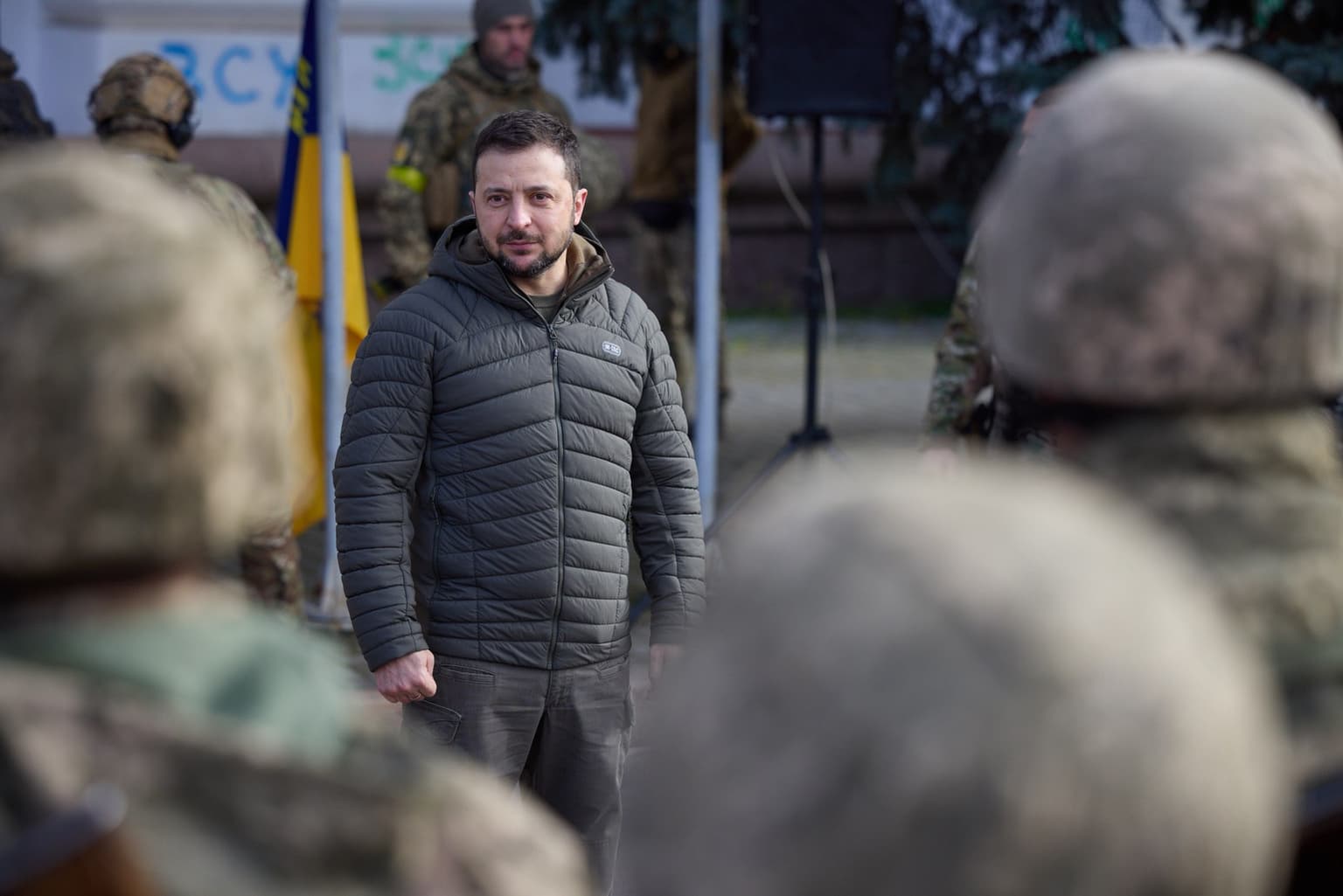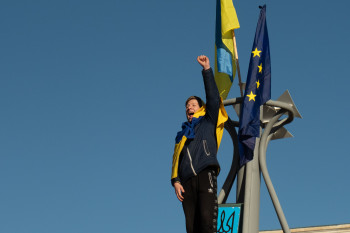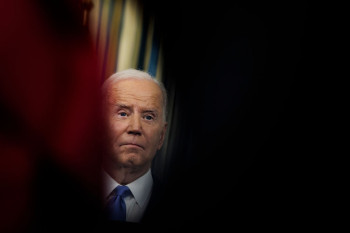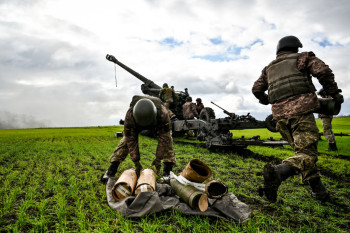Why Ukraine chooses to negotiate on the battlefield, not at peace talks

When Ukrainian President Volodymyr Zelensky proposed his 10-point peace plan to G20 leaders in Bali on Nov. 15, he had only recently returned from a historic visit to Kherson, the liberation of which marks another great step towards the return of all Russian-occupied territory.
Touching on factors such as food and nuclear security, Zelensky’s 10 points made an effort to show the world that Ukraine’s victory was in their interests. Emphasis was placed above all on the restoration of Ukraine’s sovereignty, and a rejection of empty calls for ceasefire.
“I want this aggressive Russian war to end justly and on the basis of the United Nations Charter and international law,” Zelensky said. “Ukraine should not be offered to conclude compromises with its conscience, sovereignty, territory and independence.”
In the week leading up to Ukraine’s stunning liberation of Kherson, Western media was once again swept with a wave of discussion about the need for Ukraine and Russia to negotiate a ceasefire to the full-scale war.
A spate of calls from high-profile commentators and officials have once again implored the White House to push Ukraine to the negotiating table, citing the threat of nuclear escalation initiated by a desperate Vladimir Putin facing total humiliation in Ukraine. “Ukraine’s battlefield successes could go too far,” argues Georgetown professor Charles Kupchan in a Nov. 2 New York Times op-ed. “The return of all of the Donbas and Crimea to Ukrainian control is not worth risking a new world war.”
Publicly, the Biden administration remains steadfast in supporting Ukraine to liberate all sovereign territory. The policy of “nothing about Ukraine without Ukraine” remains in place, and new deliveries of equipment and munitions are announced regularly.
This resolute support was put in question by the comments of the U.S. chair of the Joint Chiefs of Staff General Mark Milley, speaking at the Economic Club of New York on Nov. 9.
"When there's an opportunity to negotiate, when peace can be achieved, seize it,” said Milley. Following it, U.S. officials reportedly scrambled to assure Ukrainians that there was no intention to push Ukraine into a peace deal before Russian forces were expelled from Ukraine.
Under the surface, further rumors are stirring that Washington’s commitment to Ukrainian victory is less solid than it seems. Citing unnamed U.S. officials, the Wall Street Journal reported on Nov. 7 that U.S. National Security Advisor Jake Sullivan was in contact with Russian counterpart Nikolai Patrushev, a hawkish supporter of the invasion of Ukraine close to Putin. Speaking to the paper anonymously, two European diplomats claimed that Sullivan had recommended Zelensky to think about “realistic demands and priorities for negotiations, including a reconsideration of its stated aim for Ukraine to regain Crimea.”
Publicly, Zelensky has made it clear that Ukraine still aims to liberate Crimea.
On what terms?
When billionaire and newly-crowned owner of Twitter Elon Musk decided he had the answer to ending the war, he was rightfully mocked for the plainly obvious pro-Russian terms he proposed.
In Musk’s “Ukraine-Russia peace,” Ukraine would officially declare neutrality and recognize Crimea as part of Russia, while repeat “referendums” would be held in the rest of the occupied territories.
Musk’s terms read like a Christmas wish list for Putin, and were praised by his spokesperson Dmitry Peskov.
It wasn’t entirely surprising that Musk voiced a pro-Russian “peace plan.” His terms, however, were unusually specific: Pacifist advocates for peace negotiations in the West very rarely articulate the concrete terms they envisage a ceasefire could be made on. In a joint letter written on Oct. 24 by 30 House of Representatives lawmakers from the Congressional Progressive Caucus, no concrete ideas were proposed beyond “negotiated settlement and ceasefire.”This is no coincidence. The unpleasant truth is that for the millions of Ukrainians currently living under occupation, there is very little practical difference between the progressives’ proposals and Musk’s.
Above neutrality, prisoner swaps, or security guarantees, the only truly important factor of any peace deal between Russia and Ukraine is territory.
Approximately 18% of Ukraine is currently occupied by Russia, for which the primary aim of the “special military operation” was to conquer as much Ukrainian land as possible, including the capital.
Calls for Russia to retreat to the contact line as it stood on Feb. 23, as made in Kupchan’s op-ed, are deeply misguided. The front lines of Russia’s initial illegal occupation of Ukraine are not relevant in today’s context, neither for Russia nor for Ukraine. Russia can’t claim to have “liberated” anything if forced to leave cities like Mariupol.
Meanwhile, for Ukraine, this has become a much bigger struggle, against an abusive neighbor that denies its existence – and Ukrainians won’t be satisfied with the outcome if Russia continues to occupy Crimea and eastern Ukraine as it has been since 2014.
No guarantee
On Nov. 15, the same day that Russia launched dozens of cruise missiles at electricity infrastructure all over Ukraine and hit three apartment buildings in Kyiv, Russia’s Foreign Minister Sergei Lavrov complained emphatically at the G20 about Zelensky's “unrealistic” terms and unwillingness to negotiate.
With Russia being pushed out of 18,000 square kilometers of occupied territory since the beginning of September, a ceasefire now would be a dream for the Kremlin.
The bleed of territories would be stopped, buying Russia valuable time for the domestic military industrial complex to replenish its units with equipment and munitions. Russia would also stock up on long-range missiles and kamikaze drones, enabling new mass strikes that could overwhelm Ukraine’s air defense and further cripple critical infrastructure.
Most importantly, Russia would be given the chance to give some semblance of proper military training and equipment to hundreds of thousands of mobilized men, many of which are currently being thrown in waves into fruitless attacks near Bakhmut in Ukraine’s eastern Donetsk Oblast, where the heaviest fighting goes on. Russia has shown repeatedly that the core principles of the United Nations Charter, let alone a simple signed agreement, carry no weight when it comes to its actions in Ukraine.
If Russia can attempt to destroy Ukraine, occupy 18% of its territory and get away with it thanks to fatigue or fear of escalation in the West, a green light is given to the Kremlin to try again later.
With Russia laying claim on four more Ukrainian regions in September by announcing their illegal annexation, a new invasion would likely be just a matter of time.
Speaking in reaction to the mass missile strikes on Ukraine, Ukrainian Foreign Minister Dmytro Kuleba was blunt.
“This is what Russia has to say on the issue of peace talks,” he tweeted. “Stop proposing Ukraine to accept Russian ultimatums! This terror can only be stopped with the strength of our weapons & principles.”
The price of independence
For Ukrainians, the nation’s position on peace talks is even clearer. Scenes from the recent liberation of Kherson are a stark reminder of what is at stake. Those residents who protested in the face of Russian armored vehicles and spent time in basement torture chambers were now celebrating.
Tens of thousands of people finally felt safe leaving their home, reclaiming their city and their lives.
As long as Ukraine is holding the line against Russia, let alone winning as they are currently, any ceasefires or territorial concessions are a political impossibility.
For Zelensky, who has become the symbol of Ukraine’s resistance against all odds, changing tack now would have no rational basis, and be almost certainly fatal for his political perspectives.
Ukraine is united in its desire for total victory. In a poll conducted in late October by the Kyiv International Institute of Sociology, only 10% of Ukrainians would choose to make concessions to Russia in order to stop attacks on cities, with 86% in favor of continuing armed resistance.
Then there is the military. The hundreds of thousands of armed service members who stood fast in the invasion’s darkest hour and have lost countless companions in the struggle will not take kindly to being betrayed by de facto ceding Ukrainian land to Russia.
“The Ukrainian military will not accept any negotiations, agreements or compromise decisions,” said Commander-in-Chief of the Armed Forces Valerii Zaluzhnyi, recalling a phone call with Milley, whose comments on negotiations US officials have since made an effort to play down. “There is only one condition for negotiations – Russia must leave all captured territories.”
Decided on the battlefield
The idea that all wars end with peace negotiations is often propelled by those in favor of pushing Ukraine into negotiations, yet it’s objectively false. When they do though, it is because one side is forced to ask for peace.
With Ukraine enjoying success after success on the battlefield and the fighting capacity of the Russian army deteriorating, Russia is increasingly looking like the side that will have to give in to talks first before total defeat.
It would be naive to believe Russia would agree to stop the war if it entered talks. Russia’s vision of Ukraine as a non-existent nation and its goal to crush and suppress it haven’t changed since Feb. 24, and Putin has since proved himself willing to devastate Russia’s economy and social fabric to pursue them.
The news on Nov. 15 that a missile landed in Polish territory, killing two, was a reminder to the world that the impact of Russia’s war can’t be isolated within Ukraine’s borders, and especially not through a peace that puts those borders into question.
Note from the author:
Hi, this is Francis Farrell, cheers for reading this article. I grew up on the other side of the world, but in Ukraine I have found a home unlike any other. Just like so many of our readers, I understand that you don't have to be from near here to realize how important Ukraine's struggle is for freedom and human rights all over the world. The Kyiv Independent's mission is to lead the way in continuing to bring the best homegrown, English-language coverage of this war, even if the rest of the world's attention starts to fade. Please consider supporting our reporting.












